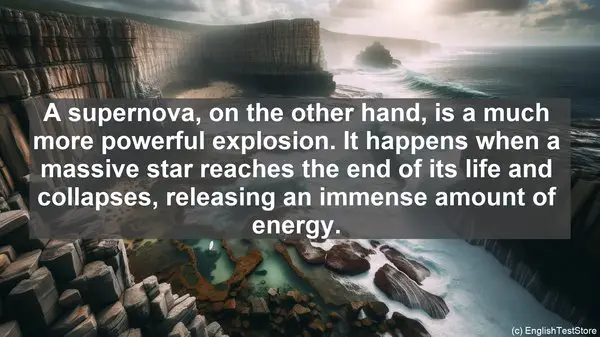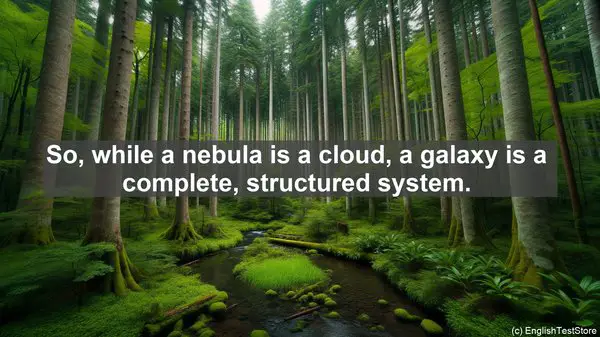Introduction
Welcome to today’s lesson. Space science is a fascinating subject, but it can also be a bit confusing. In this lesson, we’ll be discussing the top 10 commonly confused words in space science. By the end, you’ll have a better grasp of these terms and be able to use them correctly in your studies.

1. Galaxy vs. Universe
Let’s start with a classic confusion: galaxy and universe. While they may seem interchangeable, they actually refer to different things. A galaxy is a vast system of stars, planets, and other celestial bodies, held together by gravity. On the other hand, the universe encompasses everything – all the galaxies, stars, planets, and even the space between them. So, while a galaxy is a part of the universe, the universe is much larger, almost unimaginably so.
2. Asteroid vs. Meteoroid vs. Meteor vs. Meteorite
Next up, we have a quartet of terms: asteroid, meteoroid, meteor, and meteorite. These words often get muddled up, but they have distinct meanings. An asteroid is a rocky object that orbits the Sun, usually found in the asteroid belt between Mars and Jupiter. When an asteroid enters Earth’s atmosphere, it becomes a meteoroid. As it streaks through the sky, it’s called a meteor. If any part of it survives the journey and lands on Earth, it’s called a meteorite. So, in simple terms, it goes asteroid, meteoroid, meteor, and meteorite – each stage representing a different location or state.
3. Revolution vs. Rotation
Moving on, let’s talk about revolution and rotation. These terms describe the motion of celestial bodies. Revolution refers to the path an object takes around another object. For example, Earth’s revolution around the Sun gives us our year. Rotation, on the other hand, is the spinning of an object around its axis. Earth’s rotation is responsible for day and night. So, while revolution is about the object’s journey around something else, rotation is about its spin.
4. Solar System vs. Galaxy
Here’s another pair that often causes confusion: solar system and galaxy. We’ve already defined galaxy, but what about the solar system? Well, the solar system refers specifically to our star, the Sun, and all the objects that orbit it, including planets, moons, asteroids, and comets. So, while a galaxy is much larger, a solar system is a smaller, more localized system centered around a star.
5. Nebula vs. Galaxy
Nebula and galaxy are two terms that can be easily mixed up, especially since both often involve stunning, colorful images. A nebula is a vast cloud of gas and dust in space. It’s often a birthplace for stars. On the other hand, a galaxy, as we’ve discussed, is a massive system of stars, planets, and other celestial bodies. So, while a nebula is a cloud, a galaxy is a complete, structured system.
6. Comet vs. Asteroid
Comet and asteroid are two objects that can both be found in our solar system, but they have distinct characteristics. A comet is made up of ice, dust, and other organic compounds. When it gets close to the Sun, the heat causes the ice to vaporize, creating a glowing coma and often a tail. Asteroids, on the other hand, are rocky and metallic. They’re like the building blocks of planets. So, while both are objects in space, their composition and behavior are quite different.
7. Satellite vs. Moon
Satellite and moon are often used interchangeably, but they’re not exactly the same. A satellite is any object that orbits another object. So, technically, Earth’s moon is a satellite. However, when we say ‘moon,’ we’re usually referring to natural satellites – those that occur naturally, like Earth’s moon or the moons of other planets. So, while all moons are satellites, not all satellites are moons.
8. Astronomer vs. Astrologer
This one’s more about the people involved in space science. An astronomer is a scientist who studies celestial objects, their behavior, and the universe as a whole. They use observation, data analysis, and various scientific methods. On the other hand, an astrologer is someone who believes that the positions and movements of celestial bodies can influence human affairs and personality traits. Astrology is not considered a science, as it lacks empirical evidence. So, while both words start with ‘astro,’ they represent very different fields.
9. Black Hole vs. Wormhole
Black hole and wormhole are two fascinating concepts in astrophysics, but they’re not the same. A black hole is a region in space where gravity is so strong that nothing, not even light, can escape. It’s formed when a massive star collapses under its own gravity. On the other hand, a wormhole is a hypothetical tunnel that could connect two distant points in space-time. It’s like a shortcut, allowing for faster travel. While black holes are based on observations and theories, wormholes are still purely theoretical.
10. Supernova vs. Nova
Our final pair of words: supernova and nova. Both refer to stellar explosions, but they have different magnitudes. A nova is a sudden, temporary increase in a star’s brightness. It occurs when a white dwarf star pulls material from a companion star, leading to a nuclear explosion on its surface. A supernova, on the other hand, is a much more powerful explosion. It happens when a massive star reaches the end of its life and collapses, releasing an immense amount of energy. So, while both are stellar explosions, a supernova is a much more dramatic event.

